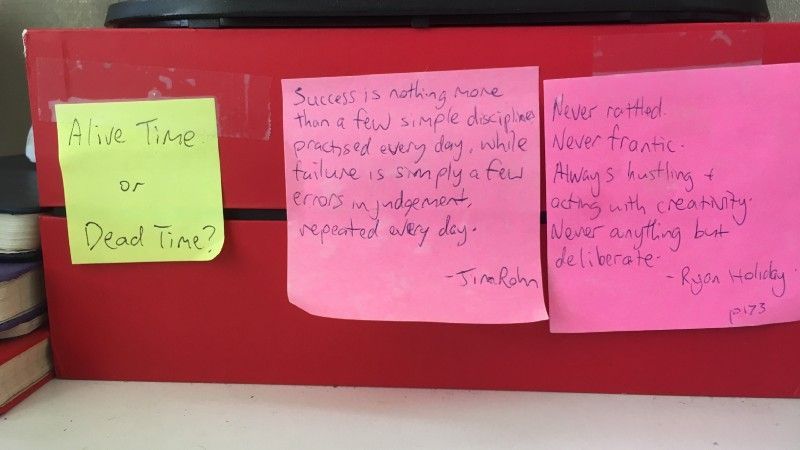Never Rattled, Never Frantic: Staying motivated during eight years in freelance journalism
andrewmcmillen (62) in writing • 16 hours ago
Never Rattled, Never Frantic
Staying motivated during eight years in freelance journalism
Underneath my computer monitor are three handwritten post-it notes that have been stuck in place for several years. They each contain a few words that mean a lot to me.
From left to right, they read as follows:
- Alive time or dead time?
- Success is nothing more than a few simple disciplines practised every day, while failure is simply a few errors in judgement, repeated every day.
- Never rattled. Never frantic. Always hustling and acting with creativity. Never anything but deliberate.
Since I began working as a freelance journalist in 2009, aged 21, I have worked from eight locations: two bedrooms, two home offices, three living rooms, and one co-working space.
At each of these locations, I took to writing or printing quotes that I found motivational or inspirational. Most of them I have either absorbed by osmosis or outright forgotten, but there’s one I found around 2011 that retains a special resonance. I printed it in a large font, and stuck it to my wall:
Nothing in this world can take the place of persistence. Talent will not: nothing is more common than unsuccessful men with talent. Genius will not; unrewarded genius is practically a cliché. Education will not: the world is full of educated fools. Persistence and determination alone are all-powerful.
(You can imagine the grin on my face when this quote featured prominently in the 2016 film The Founder, as seen below.)
That long quote was torn down and tossed during a move, but the message was internalised. If I had to narrow my success down to a single attribute, it’s persistence. I could have quit on plenty of occasions, after any one of a number of setbacks. But I didn’t.
In these motivational quotes, you may be sensing some themes.
I would be lying if I told you that the act of writing and affixing these quotes helped me on a daily, or even a weekly basis. I didn’t repeat them out loud, like affirmations. Most of the time, they were as easy to ignore as wallpaper.
But often enough in recent years, during down moments, or in times of stress or upheaval, I’d shift my gaze from the words—or the bright, blank page—on the computer monitor, and find that these few handwritten notes would help to centre my thoughts.
Let me tell you why.
- “Alive Time or Dead Time?”
This one comes from American author Ryan Holiday, based on some advice he received from his mentor:
“Early on in my career I had a pivotal conversation with [author] Robert [Greene]. I was working full-time at a really good job but planning my next move, saving my money and thinking about what I might do next. I told him I wanted to write a book one day, but I wasn’t sure what, how or when or what about. He told me, Ryan, there are two types of time: Dead time—where we are just waiting, and Alive time—where we are learning and active and leveraging. And then he left it there with me to decide which I would choose.” [source]
This concept spoke to me because, as a freelancer, “dead time” can stretch interminably. This is the nature of working apart from other people: when you are out of sight, you are out of mind. The job, then, is to constantly remind other people of not only of your existence, but of your value.
In freelance journalism, I learned to create value by pitching story ideas to editors that were so good, or so original, they had no choice but to say yes.
To me, “alive time” was researching ideas, making calls and sending emails, and having conversations with editors as to how stories could proceed from assignment to publication.
Note that I did not mention the actual work of reporting and writing.
Very early in my career, my mentor told me that I would spend 90% of my energy on story pitches, and only 10% on the actual work of completing those assignments.
This seemed ridiculous at the time, frankly, but while I’m not 100% sure on the maths, the broader sentiment was correct: the hardest part of freelancing was always generating good ideas.
Reporting stories was always the most fun part, because it involved talking to interesting people, often in unusual environments, and I could let my curiosity run rampant because I was there to ask questions that the average reader would want to know, about whichever subject I happened to be reporting on.
More plagiarism. Please stop.
Downvoting a post can decrease pending rewards and make it less visible. Common reasons:
Submit